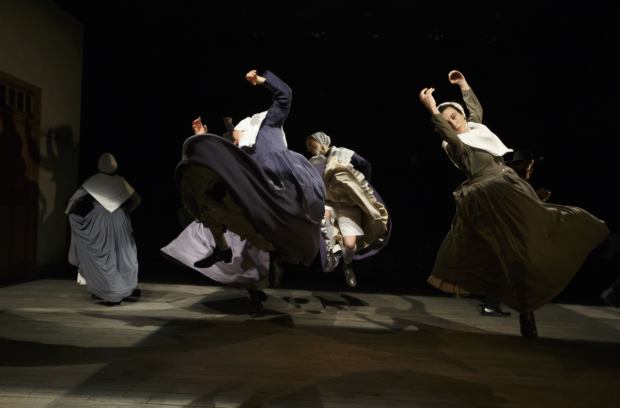Angel Reapers

(© Joan Marcus)
Experimental choreographer Martha Clarke and southern playwright Alfred Uhry may sound like an unlikely pair of collaborators, but Clarke’s eye for abstract movement blended with Uhry’s sense of Americana well suits their hybrid piece Angel Reapers, now running at the Pershing Square Signature Center. Set in a Shaker community in late-18th-century America, the piece aptly blends dance, song, and spoken word to capture the essence of the pacifistic religious sect, tortured by its commitment to celibacy.
With a revamped production, Clarke and Uhry revisit the piece they originally mounted in 2011. And if you’re familiar with the two artists’ independent works (Uhry’s most notable being the Pulitzerz -winning Driving Miss Daisy), you can expect to see Clarke’s sensibilities take the lead. Her choreography, inspired by the Shakers’ very-own dances and “ecstatic behavior” during worship services, fills most of the piece, with some Shaker hymns joining in the divine revelry.
There are short spurts of dialogue throughout, but Uhry’s words live in the same heightened, poetic world as Clarke’s movement. The most traditional dramatic text comes near the beginning, when the Shaker service members introduce themselves with the stock phrase “Today, I have the gift of—” followed by a mundane task, to illustrate the simple and confining nature of their communal lifestyles. Brother Valentine Rathburn, an orphan raised by the Shakers, is the only one to push against the group’s conventions in this opening exercise. Played by Rico Lebron with an appealing mixture of rebellion and fresh-faced curiosity, he vows to take a leisurely swim in the lake instead of tending to his chores. It’s just a minor swipe, but it foreshadows his future sexual transgressions, which the community of strict celibates (or so they claim) takes far more seriously.
Erotic tensions — homosexual, incestual, and the like — build to the point of explosion, which Clarke powerfully physicalizes through movement that is alternately tender and painfully aggressive. Offering the company’s most vulnerable performance, Ingrid Kapteyn, in the role of orphan Sister Mary Chase, shares a seminude love scene with Lebron in a moment of sexual awakening. The repressed female characters meanwhile throw their bodies into vicious circles — their uniform long dresses (designed by Donna Zakowska) whipping like tornadoes that are overpowering them from the inside out.
Mother Ann Lee, a historical Shaker leader played by the brilliant Sally Murphy, is the glue that holds this devout society together — or at least attempts to. With the maternal yet subtly threatening energy of a religious zealot, she keeps her followers in line while confiding in her brother William Lee (a sympathetic Nicholas Bruder), casting some questionable shadows on that relationship as well.
Murphy lends her beautiful soprano to a number of the show’s hymns (the term “Angel Reapers” is derived from one of these hymns), pouring the word of God into an increasingly ghoulish environment, courtesy of Christopher Akerlind’s haunting lighting design. The depictions are so chilling at times that they can feel one-sided in their representations of the religious group, ignoring its good qualities and capitalizing on the bad.
However, Clarke and Uhry are careful to keep their focus on the subject of sexual austerity — rather than broadening their scope to every facet of the Shakers — and are successful in capturing the resulting turmoil. The Shaker meetinghouse where all of the action takes place quickly becomes a hotbox of repression. Designed for historical authenticity by Marsha Ginsberg, the space holds merely a collection of straight-backed wooden chairs, a few cloudy windows, and whitewashed barn door that seals both the actors and the audience members inside.
More an atmospheric piece than a plot-driven play, Angel Reapers can be fatiguing in its most abstract moments. With only glimmers of character development anchoring you to the story, you can’t rely on a hero to carry you through to the end. Still, while it may be difficult to orient yourself in the theatrical no-man’s-land where Angel Reapers finds itself, Clarke and Uhry have alighted on an interesting common space that holds a wealth of artistic potential.











